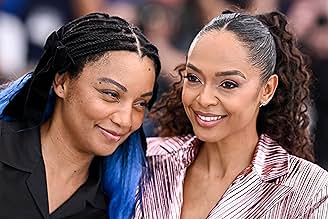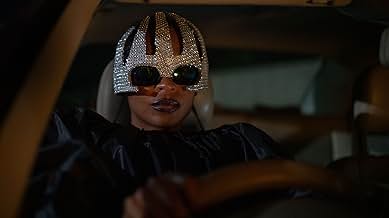Mitten in der Nacht stolpert Shula auf einer leeren Straße über die Leiche ihres Onkels. Als um sie herum die Beerdigung beginnt, bringen sie und ihre Cousins die Leiche ans Licht.Mitten in der Nacht stolpert Shula auf einer leeren Straße über die Leiche ihres Onkels. Als um sie herum die Beerdigung beginnt, bringen sie und ihre Cousins die Leiche ans Licht.Mitten in der Nacht stolpert Shula auf einer leeren Straße über die Leiche ihres Onkels. Als um sie herum die Beerdigung beginnt, bringen sie und ihre Cousins die Leiche ans Licht.
- Auszeichnungen
- 9 Gewinne & 12 Nominierungen insgesamt
Maggie Mulubwa
- Farm Club Presenter 2
- (as Margaret Mulubwa)
Empfohlene Bewertungen
Let me first just say the female roles were impeccable, full of the kind of acting that transports the veiwer. The story despite its violent & disturbing undertone was written & directed with taste. Clearly there was a deep emotional disposition of the creators & theatrical cast. Unfortunately the decision to leave the final chapter of the episode to the users imagination comes off as cowardice.. You make a movie with intriguing turns that lead to introspective meditation, you make a difference by setting an example with a production that ultimately presents resolutions. That's how trends in cultural & film are set that can actually change our world. Film, like music has the power to invoke lasting changes in our society that can transform the voice of society. I wish i could say the choice to choke the final wind from the sails of this narrative was an artistic one, but i came away feeling like it was made for many of the same reasons people stay silent about these very issues.. Fear of upsetting the crowd..
A beautiful film on a harsh topic. Nyoni presents a powerful reflection on the struggles of trying to change a world set travelling in ruts carved over centuries.
Perhaps some scenes fail to match the high standard Nyoni sets elsewhere in the film, but these do not detract from the overall force of the film.
Strong acting is presented through a tasteful and humorous use of both camera and colour. The technical direction takes what would be a solid performance by the cast and makes it even greater.
Nyoni portrays beautifully how to live in the face of grief and deep injustice. To survive together we need a will to live, and this can only come from shared joy. With no laughter we can only crawl.
Perhaps some scenes fail to match the high standard Nyoni sets elsewhere in the film, but these do not detract from the overall force of the film.
Strong acting is presented through a tasteful and humorous use of both camera and colour. The technical direction takes what would be a solid performance by the cast and makes it even greater.
Nyoni portrays beautifully how to live in the face of grief and deep injustice. To survive together we need a will to live, and this can only come from shared joy. With no laughter we can only crawl.
Protagonist Shula is driving home one day, when she finds the body of a dead relative in the middle of the road.
This event triggers the appearance of her *vast* extended family, all of which are fairly horrendous people, from the ignorant to the bigot to the superstitious, and Shula has to grin and bear it because they are family.
.. i mean .. it's competently made. It's reasonably well shot and it's definitively well acted. But this film (the majority of which is in, i think Nyanja, or some other Zambian dialect) is so culturally distant from me, that i simply cannot enjoy it. There is no way that i can ever project myself onto the protagonist, to understand what she feels, to share in her decisions. I felt more at easy with 1950s films from japan, in comparison to how i feel with this film.
It's not for me. And it's probably not for you either.
This event triggers the appearance of her *vast* extended family, all of which are fairly horrendous people, from the ignorant to the bigot to the superstitious, and Shula has to grin and bear it because they are family.
.. i mean .. it's competently made. It's reasonably well shot and it's definitively well acted. But this film (the majority of which is in, i think Nyanja, or some other Zambian dialect) is so culturally distant from me, that i simply cannot enjoy it. There is no way that i can ever project myself onto the protagonist, to understand what she feels, to share in her decisions. I felt more at easy with 1950s films from japan, in comparison to how i feel with this film.
It's not for me. And it's probably not for you either.
A pertinent fact about the little-known African bird known as the guinea fowl is that they have a unique, loud call that can be heard at quite a range, not only amongst their own kind, but also among all of the other animals within earshot. That can prove quite valuable both for the members of their own flock and for all other nearby vulnerable creatures when predators approach. While that may sound like useless trivia to some, it's a highly relevant metaphorical observation about the underlying narrative in this third feature effort from Zambian writer-director Rungano Nyoni. While driving home from a dinner party late at night on a remote rural highway, Shula (Susan Chardy) comes upon the dead body of her Uncle Fred (Roy Chisha) splayed out on the road. Somewhat surprisingly, she seems largely unaffected by what most would see as a shocking discovery. She calmly reports the incident to authorities and returns home, where she finds her relatives have begun preparing the residence for a traditional funeral gathering. Shula remains remarkably composed through all this, too, despite the many disruptions going on around her, especially incessant overblown outpourings of grief. Her relatives are somewhat offended by Shula's nonchalant behavior, upset that she doesn't show more remorse about her uncle's demise and isn't particularly respectful of their arguably overwrought mourning rituals. But, as a modern professional woman, Shula is not one to readily give in to these outdated conventions and exaggerated displays of hysteria, regardless of how time-honored and widely accepted they might be. What's more, as the story plays out, the reasoning behind Shula's cool demeanor becomes even more apparent: She hadn't spoken to Fred in years and wasn't on good terms with him - and for good reason. And, as she soon comes to discover through revealing conversations with relatives like her cousins Nsansa (Elizabeth Chisela) and Bupe (Esther Singini), those reasons become even clearer, making it apparent that Fred was arguably someone unworthy of the outpouring of angst directed his way. To make matters worse, Shula also sees that her family is just as culpable for the shamefulness behind the concealment of the many dirty little (and not so little) secrets that surface, terrible truths that have been long buried under successive layers of denial and shifted blame. Indeed, if family is supposedly everything, these are relatives with whom I'd rather have no contact. As a consequence, this is the kind of film that could easily prompt viewers to become justifiably outraged while watching it, both for the damning revelations that emerge, as well as its disturbingly frank portrayal of the deplorable treatment women are sadly accorded in this culture. Interestingly enough, however, the film manages to present this unsettling story with a deft fusion of drama and dark comedy (which may not seem quite so funny when all is said and done), coupled with tinges of surrealism (some of which work, some of which don't). Its greatest strength, though, lies in its message about the need for more of us to behave like the guinea fowl when circumstances warrant. To be sure, predators come in all forms, some of whom walk on four legs and others of whom only need two.
This movie is hopeless... I kinda feel sorry I watched it. Where on earth is the comedy here?
The hypocrisy of these women is very triggering. Lashing at each other instead of pointing the finger at the real culprit, the one who caused so much suffering to plenty of women. The scene where they corner Shula and Nsansa to supposedly declare their love, but in reality to cover up for their own lies... Hated just about everybody here, to varying degrees, of course.
Blaming and abusing the widow like that was the last straw. These women are feeding the sexism under the guise of customs and traditions.
The hypocrisy of these women is very triggering. Lashing at each other instead of pointing the finger at the real culprit, the one who caused so much suffering to plenty of women. The scene where they corner Shula and Nsansa to supposedly declare their love, but in reality to cover up for their own lies... Hated just about everybody here, to varying degrees, of course.
Blaming and abusing the widow like that was the last straw. These women are feeding the sexism under the guise of customs and traditions.
Theatrical Releases You Can Stream or Rent
Theatrical Releases You Can Stream or Rent
These big screen releases can now be watched from the comfort of your couch.
Top-Auswahl
Melde dich zum Bewerten an und greife auf die Watchlist für personalisierte Empfehlungen zu.
Everything New on HBO Max in July
Everything New on HBO Max in July
Looking for something different to add to your Watchlist? Take a peek at what movies and TV shows are coming to HBO Max this month.
Details
Box Office
- Bruttoertrag in den USA und Kanada
- 166.851 $
- Eröffnungswochenende in den USA und in Kanada
- 12.793 $
- 9. März 2025
- Weltweiter Bruttoertrag
- 237.397 $
- Laufzeit1 Stunde 39 Minuten
- Farbe
Zu dieser Seite beitragen
Bearbeitung vorschlagen oder fehlenden Inhalt hinzufügen

Oberste Lücke
What is the Canadian French language plot outline for On Becoming a Guinea Fowl (2024)?
Antwort



















